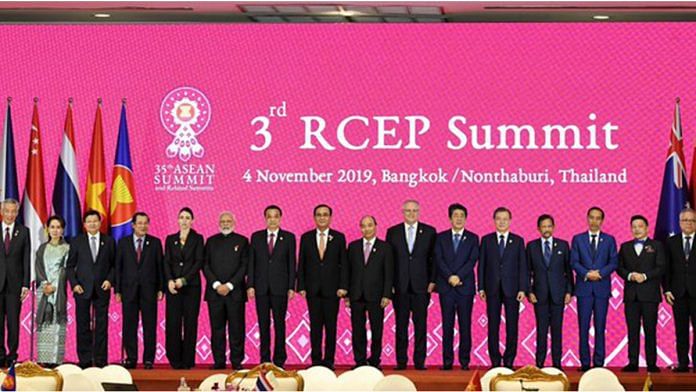New Delhi: India’s key manufacturing exports may lose market share to a China-backed Asian trade bloc, from which Prime Minister Narendra Modi walked away last year to protect the interests of local farmers and industry.
Some of India’s top 10 exports such as engineering goods, chemicals, pharmaceuticals, and electronics face erosion in market share on account of lower tariffs that members of the 15-nation Regional Comprehensive Economic Partnership enjoy for trading among themselves, according to economists. To put things in perspective, engineering products alone account for a quarter of the nation’s merchandise exports.
“In sectors where India is somewhat contributing to the global supply chain, RCEP would prove to be disadvantageous,” Amitendu Palit, a senior research fellow at the National University of Singapore, said by phone. “Under RCEP, cost of trade will come down which is a big advantage.”
As the trade pact kicks in, tariff will be eliminated on at least 92% of traded goods among participating countries. This is much more broad-based than what India has committed under its existing FTAs with Japan, South Korea or Asean.
Modi pulled out of what’s now the world’s largest free-trade agreement to appease farmers and touted the exit as a victory for India’s poor, but things have gone downhill for the economy since the coronavirus outbreak with gross domestic product declining the most among major economies. The RCEP is now seen paving the way for lowering trade barriers for member nations at a time when the pandemic poses a challenge to global commerce.
Also read: India’s RCEP exit & lure of protectionism versus creative destruction of capitalism
A spokesman for the trade ministry could not be reached immediately for comments.
The common rules of origin make the bloc an attractive destination for supply chains by making it easier for RCEP members to source inputs from within the bloc, said Priyanka Kishore, head of economics for South Asia and South-East Asia at Oxford Economics, said in an emailed response.
On the other hand, for India, the withdrawal will result in a loss of 1.2% of the nation’s projected GDP in 2030, according to a paper by Peterson Institute For International Economics.
This has exporters worried about expansion plans which may take a hit due to lack of competitive access to a huge market.
“Many sectors would want to shift to nations in the bloc to get access to the market and common rules of origin is a big advantage,” said Sharad Kumar Saraf, president of the Federation of Indian Export Organisation, India’s largest exporters’ group.
As China takes an even greater role in Asian trade, Saraf says the only consolation for Indian exporters in a post-RCEP world are the proposed free trade deals with the EU, the U.K. and the U.S. — three economies that are India’s top export destinations.
This also may force India to re-think eventually on joining multilateral pacts, which it is currently shunning in favor of bilateral agreements, Oxford Economics’s Kishore said.- Bloomberg
Also read: Not signing RCEP could be one of Modi’s biggest blunders, ‘atmanirbhar’ an admission of defeat




the other countries will soon find it is China getting all the benefits, not them.
India relies on services exports and the future too is in that so any goods access to any market is not worth the sacrifice of services exports,we can do bilateral trade agreement with countries in asean to let our services boom there is no need for this rcep agreement which doesnt address indian interest,if 20 billion dollars is what we miss than so be it ,these rcep countries will miss 200 billion dollar market so it is their loss,india can export mobile phones and electronics to usa and hopefully to eu and south korea and make up for this loss,we can import defence equipment from usa and eu so a trade balance can be accomplished which can never happen if rcep is signed.The best part would be that services sector of india will be open in eu and usa which these rcep countries would never grant india,so it is a losing proposal for india to do business with them.
Now common Indians will become poorer as they will be forced to buy higher priced shoddy goods from domestic companies run by crony capitalists. Crony capitalists will milk the common Indian and donate a part of their extortionate profits to lawmakers so that they can continue to be protected.
India has to pay heavily for this decision in future to come.
RCEP would have ensured Indian industry & jobs for low/unskilled are destroyed through cheap/dumping of imports.
All benefits touted are theoretical and in reality some big exporting nations in RCEP like china, Japan, S Korea have very restricted market access to outsiders. They have intentionally erected non-tariff barriers to deny market access while willfully benefitting from their export driven growth.
If they can dump goods in India why would they invest in setting up facilities – no FDI will happen.
Without addressing India’s concern on including
Services, free movement of people, benchmark year, MFN status, rules of Origin, tarrif application Bipin reaching limits RCEP will not be of any help to us.
Last security implication – why should we finance China which uses dumping as means to kill our capacity/factories and make us dependent/subservient to it and also use same money to finance enimical activities against India